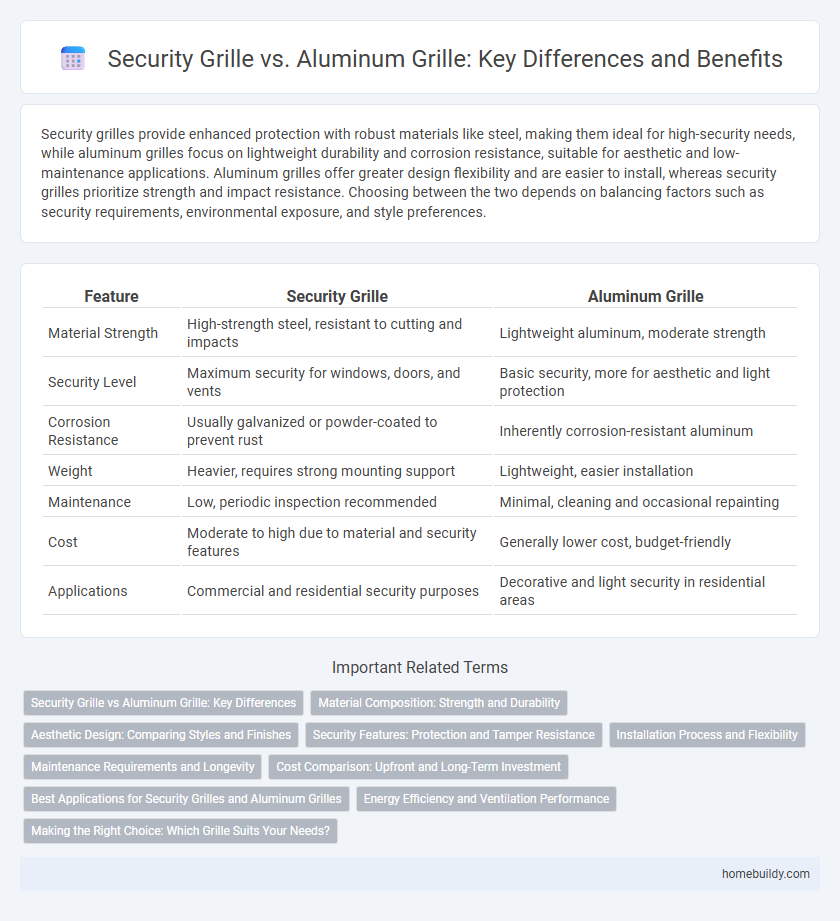Security grilles provide enhanced protection with robust materials like steel, making them ideal for high-security needs, while aluminum grilles focus on lightweight durability and corrosion resistance, suitable for aesthetic and low-maintenance applications. Aluminum grilles offer greater design flexibility and are easier to install, whereas security grilles prioritize strength and impact resistance. Choosing between the two depends on balancing factors such as security requirements, environmental exposure, and style preferences.
Table of Comparison
| Feature | Security Grille | Aluminum Grille |
|---|---|---|
| Material Strength | High-strength steel, resistant to cutting and impacts | Lightweight aluminum, moderate strength |
| Security Level | Maximum security for windows, doors, and vents | Basic security, more for aesthetic and light protection |
| Corrosion Resistance | Usually galvanized or powder-coated to prevent rust | Inherently corrosion-resistant aluminum |
| Weight | Heavier, requires strong mounting support | Lightweight, easier installation |
| Maintenance | Low, periodic inspection recommended | Minimal, cleaning and occasional repainting |
| Cost | Moderate to high due to material and security features | Generally lower cost, budget-friendly |
| Applications | Commercial and residential security purposes | Decorative and light security in residential areas |
Security Grille vs Aluminum Grille: Key Differences
Security grilles are primarily designed for maximum protection with heavy-duty steel construction and reinforced locking mechanisms, whereas aluminum grilles emphasize lightweight durability and corrosion resistance. Steel security grilles offer superior impact resistance and enhanced theft deterrence compared to aluminum variants, which are better suited for aesthetic appeal and light security needs. The choice between security and aluminum grilles depends on the balance required between robust security features and ease of maintenance.
Material Composition: Strength and Durability
Security grilles are typically made from heavy-duty steel or wrought iron, offering superior strength and resistance to forced entry compared to aluminum grilles. Aluminum grilles, while lightweight and corrosion-resistant, lack the same level of impact resistance and durability under harsh conditions. The choice of material composition directly affects the grille's ability to provide long-lasting security and withstand physical attacks.
Aesthetic Design: Comparing Styles and Finishes
Security grilles offer robust protection with a variety of aesthetic designs that range from classic wrought iron patterns to sleek modern styles, often customizable with intricate detailing and powder-coated finishes. Aluminum grilles provide a lightweight, corrosion-resistant alternative featuring contemporary minimalist designs and a wide selection of anodized or painted finishes that maintain color vibrancy over time. Comparing styles and finishes, security grilles excel in decorative appeal and traditional charm, while aluminum grilles prioritize clean lines and versatile color options for modern architectural complements.
Security Features: Protection and Tamper Resistance
Security grilles provide robust protection with heavy-duty steel construction that resists bending, cutting, and forced entry attempts more effectively than aluminum grilles. Their tamper-resistant design often includes reinforced locking mechanisms and embedded steel bars, enhancing durability against break-in tools. Aluminum grilles offer lightweight corrosion resistance but generally lack the same level of security and impact resistance critical for high-risk environments.
Installation Process and Flexibility
Security grilles offer straightforward installation with adjustable mounting options suited for various wall types, ensuring a versatile fit in both residential and commercial settings. Aluminum grilles, while lightweight and corrosion-resistant, often require precise measurements and specialized tools for secure installation, limiting flexibility during fitting adjustments. The adaptability of security grilles makes them preferable when quick installation and customizable sizing are priorities.
Maintenance Requirements and Longevity
Security grilles require regular maintenance to prevent rust and ensure optimal functionality, typically involving cleaning, lubrication, and inspections every few months. Aluminum grilles offer superior corrosion resistance, significantly reducing maintenance efforts and extending their longevity, often lasting over 20 years without significant degradation. Choosing aluminum grilles minimizes long-term upkeep costs and provides enhanced durability in various environmental conditions.
Cost Comparison: Upfront and Long-Term Investment
Security grilles typically involve a higher upfront cost due to robust materials and custom manufacturing compared to aluminum grilles, which offer a more budget-friendly initial investment. Over time, aluminum grilles require less maintenance and provide corrosion resistance, lowering long-term expenses, whereas steel-based security grilles may incur additional costs for painting and rust prevention. Evaluating total cost of ownership reveals aluminum grilles deliver better value through durability and reduced upkeep despite the slightly higher initial price.
Best Applications for Security Grilles and Aluminum Grilles
Security grilles are ideal for securing commercial properties, retail stores, and warehouses, providing strong physical barriers against break-ins while allowing visibility and ventilation. Aluminum grilles excel in residential settings and decorative applications due to their lightweight nature, corrosion resistance, and aesthetic flexibility. Selecting between security and aluminum grilles depends on the need for maximum security versus design and maintenance considerations.
Energy Efficiency and Ventilation Performance
Security grilles typically offer enhanced ventilation performance due to their open design, allowing for better air circulation compared to aluminum grilles, which may have denser patterns that restrict airflow. Energy efficiency is also influenced by the material properties; aluminum grilles, with their reflective surface, can help reduce heat absorption and improve thermal regulation in buildings. Choosing between security and aluminum grilles involves balancing security needs with optimal airflow and energy savings.
Making the Right Choice: Which Grille Suits Your Needs?
Security grilles offer robust protection with heavy-duty steel construction, ideal for high-risk areas requiring maximum security, while aluminum grilles provide a lightweight, corrosion-resistant option suitable for moderate security needs and aesthetic appeal. Choosing between security grilles and aluminum grilles depends on factors such as desired security level, environmental exposure, maintenance requirements, and budget constraints. Assessing these parameters ensures the selection of a grille that effectively balances safety, durability, and visual design for your specific application.
Security grille vs Aluminum grille Infographic

 homebuildy.com
homebuildy.com